

PopEntertainment.com
>
Oscar Nominees >
Feature Interviews - Actors >
Feature Interviews - Actresses >
Feature Interviews A to E >
Features Interviews F to J
> Feature
Interviews P to T >
George
Clooney, David Strathairn, Patricia Clarkson and Grant Heslov (2005
Interview)
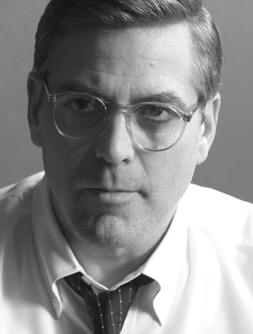 George
Clooney, David Strathairn, Patricia Clarkson and Grant Heslov
George
Clooney, David Strathairn, Patricia Clarkson and Grant Heslov
Patriotic Acts
by Jay S. Jacobs
Copyright ©2005
PopEntertainment.com. All rights reserved.
Posted: October 1, 2005.
The word legendary is tossed
about way too cavalierly, however Edward R. Murrow is legitimately a legend
of television broadcasting. The newsman took his radio fame (from his
current affairs show Hear It Now) and translated it to See It Now
for the nascent
art form of television.
Murrow was an old school
journalist, one to whom the truth was of paramount importance. It was
more important than money. It was more important than the job.
It was more important than the corporation. However, Murrow did have
to make some concessions for his show. The biggest one was hosting a
fluffy personality-based series called Person to Person, in which he
interviewed the personalities of the day, like Liberace.
However, Murrow's real
talent was as a newsman, and he took his responsibility very much to heart.
His career reached its ultimate crossroads when Murrow became the first
journalist to question the tactics of Senator Joseph McCarthy.
McCarthy had become a cause celebre by insisting that the State
Department was infested by "card-carrying" Communist sympathizers.
This started the so-called "Red Scare" and caused very public trials in
which many innocent Americans were branded communists.
Murrow was horrified by the
misuse of power, so he stood up and used film of McCarthy to condemn him.
Murrow knew that the stand would cause him great grief. As Murrow
predicted, McCarthy responded by accusing him of communism and having
sympathetic journalists and citizens vilify Murrow and his associates.
He knew it would not be a popular stance with his network, CBS.
Network honcho Bill Paley kept the wolves from the door as long as he could,
but they lost advertisers and angered executives and stock-holders.
This very public feud ended
up effectively destroying both men's professions. McCarthy was
disgraced and defanged in public and served out the rest of his term in
disgrace. Murrow's career was never the same, either, he was demoted,
given a lesser timeslot, and eventually left journalism a few
years later.
The Murrow-McCarthy showdown
has been visualized in the evocative new film Good Night, and Good Luck.
(The title is derived from Murrow's nightly sign-off.) The movie is a
long-planned dream project for movie star George Clooney, who directed and
co-wrote the film with long-time creative partner Grant Heslov. "Grant
and I go back twenty-some years,"
Clooney reminisces. "He
loaned me a hundred bucks to get headshots for a Joanie Loves Chachi
episode, which I did not get...
Iím still paying him back for it."
Even though Clooney had no
real urge to act in the film, he does that as well, taking a supporting
role, portraying Murrow's legendary producer and partner Fred Friendly.
Taking this role, Clooney acknowledges, was in part playing a necessary
piece in the Hollywood game.
"I
didnít really want to act in the film," Clooney says.
"It isnít fun directing yourself.
'How was I? Fantastic. I think you look younger.'
Itís not fun, but it was a black-and-white
movie starring David Strathairn, for seven-and-a-half
million dollars, so they were gonna make sure that I was in it one
way or another."
However,
he knew even though he may be the most recognizable member of a
well-respected cast, he was not going to be the face of the film. In
fact, being a face in the crowd is the way he prefers to work.
"I like ensembles...
ER was an ensemble. I had all of my successes out of
ensembles. Quite honestly,
I like working with people that are friends. Its
fun. I have a fun set when weíre there.
The setís a fun place to be, because I think
itís healthy and good work comes out of it."
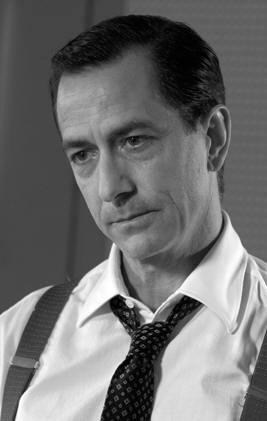 Of
course, there is a certain accountability in playing real characters.
Most of this burden falls right upon the capable shoulders of David Strathairn. Strathairn has been a respected actor in Hollywood for
over two decades, and yet his quality has
not translated in him becoming a household name. He has done notable
turns such as playing innocent-but-tormented Chicago Black Sox pitcher Eddie Cicotte in Eight Men Out, Meryl Streep's worried husband in The
River Wild, the violent husband in Dolores Claibourne, a priest with a secret in Simon Birch and Helen Keller's father
in the TV remake of The Miracle Worker. He has also appeared in Silkwood,
Ice Man, At Close Range, A League of Their Own, Sneakers, Lost In Yonkers,
The Firm, LA Confidential and several films by friend and director John
Sayles. "He
was really the only guy we ever talked about," Heslov
says. Clooney
takes it a step farther, "He was the only guy we
ever thought of."
Of
course, there is a certain accountability in playing real characters.
Most of this burden falls right upon the capable shoulders of David Strathairn. Strathairn has been a respected actor in Hollywood for
over two decades, and yet his quality has
not translated in him becoming a household name. He has done notable
turns such as playing innocent-but-tormented Chicago Black Sox pitcher Eddie Cicotte in Eight Men Out, Meryl Streep's worried husband in The
River Wild, the violent husband in Dolores Claibourne, a priest with a secret in Simon Birch and Helen Keller's father
in the TV remake of The Miracle Worker. He has also appeared in Silkwood,
Ice Man, At Close Range, A League of Their Own, Sneakers, Lost In Yonkers,
The Firm, LA Confidential and several films by friend and director John
Sayles. "He
was really the only guy we ever talked about," Heslov
says. Clooney
takes it a step farther, "He was the only guy we
ever thought of."
He felt the need to be
as realistic as possible, because his role of Murrow is an iconic figure in
journalism and American
History. "When
you have to pull something out of the imagination of the author Ė the
fictitious thing Ė at the get go, youíre
responsible to a different set of circumstances, I think,"
Strathairn acknowledges. "Because always
youíre responsible to the script. In
this particular case, it wasnít a bio pic, so George wasnít exploring the
man alone at the bar or at home on his farm. That, to
a certain extent, focused what I had to be attentive to.
Yes, there is a responsibility when itís a historical character,
especially of such magnitude as someone like Edward R. Murrow.
You are respectful of the image of
people who know him and are still alive have of him. Theyíre remembering
that image. Then, also, in many ways there is a responsibility to present
as an objective and respectful image to people who have no idea who he is."
However, he insists, it is not a simple job of
mimicking the man. "George said no, this is not an impersonation."
Patricia Clarkson is also a
part of the talented ensemble. She has been one of the busiest actors
in Hollywood in recent years, starring in the acclaimed films Far From
Heaven, Pieces of April, The Station Agent, Dogville, Miracle and The
Woods, as well as playing the recurring role of Ruth Fisher's hippie
sister on the series Six Feet Under. Clarkson, who plays
pioneering female television exec Shirley Wershba in Good Night, and Good
Luck, admits she had it a little easier than Strathairn.
"The
main reason [is] that there's
not a lot of footage of Shirley," Clarkson says.
"I also was fortunate in that sheís still very
much alive and I met with her. Iím just madly in love with her. Sheís a
remarkable woman, still. Sheís had a remarkable life. Sheís funny and
 winning,
still atÖ I donít want to give away her ageÖ I met with Shirley, talked to
her. I feel like I have a new friend in my life. I extracted what I
could. I wanted to be a part of
this movie. There was not a lot of Shirley, but what there is, is choice.
I wanted to try to capture her spirit. Her essence. Her wit and
intelligence, which she has mountains of. So, it was lovely. It was a beautiful thing that happened on this film for me. Meeting this
wonderful woman and just extracting a little part of her and taking it into
the film with me."
winning,
still atÖ I donít want to give away her ageÖ I met with Shirley, talked to
her. I feel like I have a new friend in my life. I extracted what I
could. I wanted to be a part of
this movie. There was not a lot of Shirley, but what there is, is choice.
I wanted to try to capture her spirit. Her essence. Her wit and
intelligence, which she has mountains of. So, it was lovely. It was a beautiful thing that happened on this film for me. Meeting this
wonderful woman and just extracting a little part of her and taking it into
the film with me."
As far as Clooney, he
decided to be a little less lifelike in his portrayal of producer Fred
Friendly. Not because of any humbleness on the part of the actor, but
mostly because of the personality of the character. "Fred,
those of you who knew him or know of him -- he
really took over a room. He came in and he
was bombastic. I decided early on that that
canít be the nature of this character because this was about the story and
about these words. So,
I took it just because I thought itís a big enough part that I can help get
the money and I have a sense as a director of how much or how little of
Fred I wanted it to be. I wanted it to be
the relationship between the guys. I wanted
it to be the camaraderie. I wanted it to be
some of the fun. I wanted there to be the
drive. But, I
donít want him to take over a room. As an
actor Iím most proud of the fact that Iím in those scenes and youíd never
look at me, which you know is [significant]
because I really enjoy looking at me."
And what
was Grant Heslov's motivation in portraying future CBS exec Don Hewitt?
"Well I chose my character because we couldnít
find any one else to play it," Heslov acknowledges
cheerfully. "Because it was easy for
me to do it. We never really knew when that
character was going to work and that way I could just suit up if I had to
and just go in the scene. It was so simple."
Not so
simple is the film's politics. It's hard not to notice that many of
the concerns which Murrow had are being replayed now in the United States
halls of power. In particular, the case of Navy pilot
Milo Radulovich,
who was discharged from the military for no apparent reason other than the
fact that his father and sister may or may not have had communist ties.
It is guilt by association, and the story, which is covered in great depth
in the film (including a replay of Murrow's original story on the subject)
is eerie in its similarity to recent claims of Arab citizens who claim that
they were held against their will, without legal advice or any limits on the
time which they can be questioned.
So is
Good Night, and Good Luck something of an indictment of the Patriot Act?
"Maybe
itís no coincidence that the film is being released the same week that itís
being voted on," Strathairn allows.
"Yeah,
maybe youíre rightÖ," Clarkson laughs.
"Itís not an indictment,"
Clooney insists. "It is a debate of it.
Certainly weíre about to have this
new vote. I donít know which one
[version of the Act] youíve read; if youíve
read the House or the Senate one. The House
oneís terrifying.
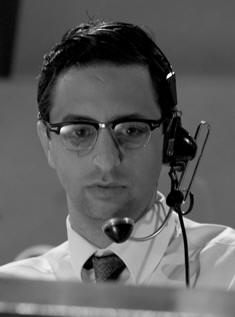 But I think that with any
luck weíre at a place now in our country where it isnít 'my
country, right or wrong,' again, and that people
will have honest discussions about whether or not you want to give away
certain civil liberties in the pursuit of saving the State.
I think itís an important debate to have.
I
donít have the answers for it. But I think
its important to be talking about."
But I think that with any
luck weíre at a place now in our country where it isnít 'my
country, right or wrong,' again, and that people
will have honest discussions about whether or not you want to give away
certain civil liberties in the pursuit of saving the State.
I think itís an important debate to have.
I
donít have the answers for it. But I think
its important to be talking about."
Straithain continues, "If it is a platform for
potential neurosurgery to be applied on [the Patriot Act],
yeah. [However,] George and Grant will adamantly say that this was not intended as a
proselytizing, polarizing picture."
Clarkson
agrees, "No,
I think it actually began out of Georgeís love for Murrow."
That
love and respect suffuses every frame of Good Night, and Good Luck.
Clooney had been fascinated with Murrow's story for years, introduced to
the maverick newsman by his father Nick, a long-time reporter and anchorman
who is currently a
Congressional candidate in Kentucky.
"It
started obviously because I grew up on a newsroom floor,"
Clooney recalls, "watching my dad work with
reporters like Deborah Dickson in Cincinnati, Ohio and Howard Ain and these
really wonderful reporters. Watching
them piece a news show together. Murrow was
always the high watermark that everyone aims for. So
it was my love of that and it was certainly a tip of the hat to my dad and
the sacrifices that he made over the years."
Nick
Clooney was thrilled his son would be making a film about his hero, and he
gave George a piece of advice. "He
just said the one thing to me constantly, that was important,"
George Clooney says. "We talked about [it]
a lot, Grant and I. He said, treat it
like a journalist. Double
check, double source every scene so that when the people that want to
marginalize it, and they are out there, they can [try to]
marginalize the film all they want.
But, we wanted it to be based strictly
- each
scene happened. It's important to say that because there is sort of a
revisionist history going on that McCarthy was right and Murrow was a
traitor. Page Six [in The New York Post]
actually wrote a nice story about that. Ann
Coulter certainly has a lovely book about it,
about Murrow getting the story wrong. It was
important to recalibrate fact, period fact. So
my dad said get the facts right.
"In
doing the research we learned that it was important for us to go back to the
original material," Clooney continues.
"For instance, Point of Order, which some
of you may know, is the documentary made about the Army-McCarthy
hearings. If we
just used that as our source, the problem is --
and Iím an old liberal -- it's
really unbelievably, manipulatively bad.
Bad. I mean,
they have that scene where McCarthy is screaming at Senator Simonton,
'donít you ...' and they
cut to this wide shot of him and it looks like
Frederick March at the end of Inherit the Wind.
'Where you think your going?
Don't go anywhere!'
When we got into the archival footage and
watched [it] all, Grant called me up and said,
'youíre not going to believe this.'
It was two different days.
So the problem is -- what our job was
-- is to make sure that we went back to all of the source material
from the very beginning so that we werenít going to compound any sort of
myth that had been made in an editing room. That
was our job and it made it more complicated because we thought we could just
use the source material that we had. We
found ourselves having to check everything."
Another way in which they
assured accuracy was that Clooney and Heslov decided to use real footage of
Murrow's stories and of Senator McCarthy. They tried out the idea of
an actor to play the red-baiting senator, but in the end they realized that
Senator McCarthy was so over-the-top that any actor they brought in to play
him would look like he was chewing the scenery. So they decided to let
McCarthy speak for himself, just like Murrow did fifty years ago.
"We
wanted to use McCarthyís own words," Heslov says.
"We thought that in the end it would be most
effective..."
"And
it was much cheaper," Clooney interjects.
Heslov
agrees, "And it was cheaper."
"We were also going to take out an ad
in the trades," Clooney continues. "Best
supporting actor -- for your consideration
-- Joe McCarthy."
Not only did they have to
worry about the facts of the case, they also spent an inordinate amount of
time making sure they got the everyday details of life in 1953-54 correct.
And despite the fact that he is a non-smoker, Strathairn was one
of many characters who smoked like a chimney, "Because
thatís what they did."
The newsmen were made to
learn about the stories of the time.
"We
were given the copy of The New York Times from March, 1953,"
Strathairn says. "We had the headlines.
What was actually happening that day, or the day before. George would say,
'Okay, Matt, youíre going to cover local news. Robert Downey, youíre going
to do the obits. Come up with a story about today. Pitch your story in the
scene. So, okay, off you go.' Now, also try to find something that was not
directly related to what is in the script for that day, but something thatís
germane to the issues. So everybody, they went back and put the hair and
make-up on, and everybody was memorizing lines. (Then they went back) and
heíd say, 'Okay, what have you got?'
'Umm, well, letís see, the Brooklyn
DodgersÖ was it Jackie RobinsonÖ' They got it so it was live,
really live. It was a real testament to the ensemble, these guys were
amazing. Iíd sit in the back of the roomÖ"
Clarkson adds, "And a lot of itís all on
the cutting room floor, but I mean, they would
riff on the day, like the events of the day."
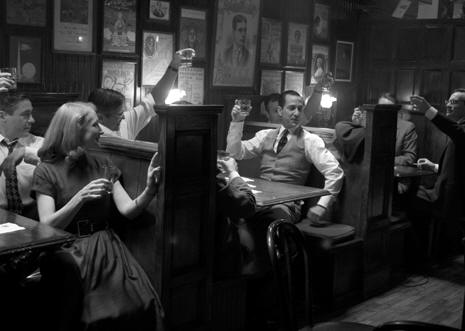 "Which
is a tall order, because they talked differently back then,"
Strathairn continues. There was no 'like,
you know,' 'like,'
'like'Ö"
"Which
is a tall order, because they talked differently back then,"
Strathairn continues. There was no 'like,
you know,' 'like,'
'like'Ö"
"And
the speed of the dialogue was different," Clarkson agrees.
"Oh, yes. Everything louder, fasterÖ"
"In the mornings, they would
come in and we had a real newsroom set up with their own typewriters and
their own desks," Clooney recalls. "Every
morning youíd say today is October 4, 1954, and they had The New York
Times, The New York Post, The Washington Post of that day with all the
ads and everything. They
would sit there with their little manual typewriters and they would go
through the papers and they would pick their stories.
Then we would go into the room after a couple hours when we
were ready to start, with the cameras set, and weíd have two cameras going
and theyíd start rolling and I would go, 'OK
whatís your lead, letís hear it.' We
did it the way Iíd watch my dad put together a news program every night.
That had an energy to it that I really loved
and I felt. It
reminded me of the things I grew up watching in the news. Itís
a funny thing how these guys will take on these characters.
Trying to pitch. Itís
like my dad trying to pitch Metro stories, which just never are going to
make it to the front. I think it should be a
lead. No, Metro."
"George
knows that world," Strathairn
concludes. "He grew up in that world."
Clarkson also had the strange experience of being the only woman in the Boys
Club of the newsroom. This was odd coming right after working with so
many women on Six Feet Under. "I loved doing Six Feet
Under and working with Frannie Conroy and Kathy Bates,"
Clarkson says. "It was a dream. One that
I think I miss already. Itís difficult for me to articulate, actually.
Itís just a different feeling. Theyíre both lively."
Strathairn
laughs, "With men she walks into a room and they all look at her. I
donít know, maybe she walks into a room like with a bunch of women they just
look that her clothes."
"Every
time I walked in in those little 50s dresses," Clarkson
agrees. "They give you likeÖ"
She mimes watching
someone walk past.
"Yeah, whenever Iíd walk in in that red dress, all
the boys were like, 'whoooaaaÖ'
Iím telling you. I didnít want to go home...
It was sexy. It was
very sexy... Well, letís get down to it. It was
sexy and flattering. Come on. Iím in a room with all these intelligent,
smart men. With like a 23-inch waisted dress. My
hair all dingy-doingy."
So,
does this immersion into the world of Journalism give any of the makers of
Good Night, and Good Luck pangs of regret for the road not taken?
"No, I donít have the talent for
[journalism]," Clooney admits freely.
"I tried it when I was young.
My dadís one of the best Iíve ever seen.
[I couldn't keep up with] the people who do
this really well . The people who ask direct
questions and are fearless."
Clarkson, on the other hand, would give it a try. "I
would love to," she says enthusiatically.
"Iím a news junkie. Iím obsessed. I love
reporters and journalists. I think in my next life, thatís what Iíd like to
be. Maybe not an anchor, but Iíd love to be a journalist. Iíd love to sit
and interview people."
Well,
if the actors will not be journalists (at least in this life), what about
the ones out there? Is it possible for a modern TV newsman or reporter
to change the world like Murrow did in the 50s? Complaints abound that
modern journalists do not ask the tough questions. They tell the
cheesy and exploitative stories rather than the truly important ones.
They are handcuffed by the bottom-lines of the mega-corporations which own
the sources of information. They are locked out by an administration
which will not in any way cooperate, instead repeating talking points and
spin incessantly. Could there be another Murrow out there?
"I
thought Brian Williams," Clooney says.
"Heís really articulate and really
smart. I think heís the best of the guys
Iíve seen so far. Iíve seen him especially
on Jon Stewart. I thought he was smart
because he answered some funny questions and then he avoided answering the
ones that would get him in Dodge. The
difference is, thereís still Bill Moye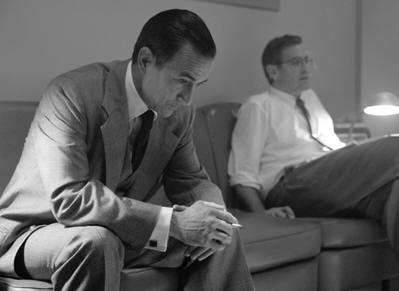 rs.
Thereís still great reporting going on by a
bunch of people. The problem is that I donít think anybody is ever going to
have forty million people watching them again.
It may be good that there wonít ever be the
most trusted man in America again -- depending on
who that man is."
rs.
Thereís still great reporting going on by a
bunch of people. The problem is that I donít think anybody is ever going to
have forty million people watching them again.
It may be good that there wonít ever be the
most trusted man in America again -- depending on
who that man is."
"I
think there are shades of Murrow in several journalists now,"
Clarkson says. "I think there are some
great journalists who are vigorous and determined and thoughtful. But I
think itís interesting, with [Hurricane] Katrina, something happened. Everyone started
to really step up to the plate."
"I saw some real teeth in
journalism in Katrina," Clooney agrees.
"It
always seems that we are Monday morning quarterbacks, I guess, in society,"
Strathairn
says. "Shoulda, coulda, woulda, didnít.
Being able to look over our shoulder and then fixing what had happened
yesterday and finding a way to do it. Like they are doing in Texas right
now. But, I donít think itís possible for a Murrow to exist, purely for the
reason that he spoke to 40-60 million people at one time.
Brian Williams last night said I speak to two to
three million. Itís just so fractured now. So diverse.
The last high-water mark was Walter Cronkite,
in 1968, when he came back and basically changed government policy by what
he said about Vietnam. Brian Williams said, 'If I
wanted to say, ĎHave you no decency? At long last have you no decency?í I
would have to say it on a blog. Iíd have to say it on C-SPAN. Iíd have to
say it on ESPNÖ"
"ÖOn
HBOÖ," Clarkson interjects, "you
know, justÖ
"Öfor
people to hear it," Strathairn concludes.
Speaking of reaching
people, do they worry about finding an audience for a serious
black-and-white drama which looks at serious legal and ethical implications?
Also, in this deeply polarized country, will they be able to capture a wide
audience or are they just preaching to the converted? Will they be
able to get the popcorn viewers to see their quality work?
"Well,
even if everyone who is converted goes to see it, thatís still a good thing,"
Clarkson says. "I donít want to push away
the converted. But, I have to tell you, maybe Iím
naÔve, but I have this thought. I have many
nieces and nephews and I have this feeling that [for]
18-25 year olds on the college campuses where itís going to play,
Murrow might become a new kind of folk hero. I donít think thatís that far
fetched. I think that he might have a resurgence."
"The political air of this film, which
is an air that everybody breathes. Itís not just the choir. I think itís
in the air, whatís in this movie," Strathairn
says. Then he jokes,
"And
oh my God, this is an action pictureÖ"
Clarkson laughs, "And thereís a lot of T&A,
too."
Heslov
says, "We had an alternative ending..."
Clooney
chuckles, "It was a musical number."
However, while there is much funny in the film (very little of the
thrill-packed tuneful jiggling they just promised, though...) in the end, it
is about a deadly serious subject. An issue that is every bit as
trenchant today as it was in the McCarthy era.
Clarkson says, "I think the themes of
this movie, of course, continue on in the world. In the government.
The political system.
Responsibility of journalism. Civil rights. Civil
liberties. Many things. I think, in a way, you have to kind of present the
past so you donít repeat it. And remember itÖ"
"It
isnít overtly political," Clooney insists.
"It is a film by someone who happens to be
political. But itís a historical piece. We
were very careful with our facts to be sure of that. If
that opens up a debate of any sort of political or journalistic questions,
then good. And if it doesnít thatís
okay. We did our jobs. If
some kid in Cincinnati sees it in his journalism class and decides he wants
to be a writer because of it and wants to hold certain standards then
we win. We win."
CLICK HERE TO SEE WHAT GEORGE CLOONEY HAD TO SAY
TO US IN 2011!
CLICK HERE TO SEE WHAT DAVID STRATHAIRN HAD TO
SAY TO US IN 2008!
CLICK HERE TO SEE WHAT PATRICIA CLARKSON HAD
TO SAY TO US IN 2009!
Email
us Let us know what you
think.
Features
Return to the features page




